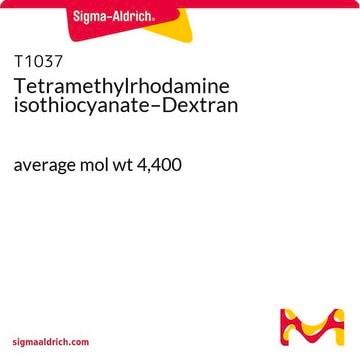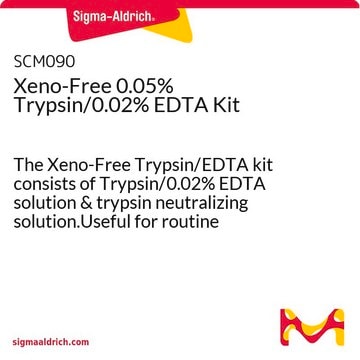T3924
Trypsin-EDTA solution
1 ×, sterile; sterile-filtered, BioReagent, suitable for cell culture, 0.5 g porcine trypsin and 0.2 g EDTA, 4Na per liter of Hanks′ Balanced Salt Solution with phenol red
Synonym(s):
Cell dissociation enzyme
About This Item
Recommended Products
biological source
Porcine
sterility
sterile; sterile-filtered
product line
BioReagent
form
solution
mol wt
23.4 kDa
concentration
1 ×
technique(s)
cell culture | mammalian: suitable
single cell analysis: suitable
impurities
Porcine parvovirus, none detected (9 CFR)
pH
7.0-9.0
shipped in
dry ice
storage temp.
−20°C
Looking for similar products? Visit Product Comparison Guide
Application
Suitable for use in preparation of single cell suspension for sequencing.
Biochem/physiol Actions
Serine protease inhibitors, including DFP, TLCK, APMSF, AEBSEF, and aprotinin, amongst others, will inhibit Trypsin.
Components
Caution
Preparation Note
also commonly purchased with this product
recommended
related product
Storage Class Code
12 - Non Combustible Liquids
WGK
WGK 1
Flash Point(F)
Not applicable
Flash Point(C)
Not applicable
Certificates of Analysis (COA)
Search for Certificates of Analysis (COA) by entering the products Lot/Batch Number. Lot and Batch Numbers can be found on a product’s label following the words ‘Lot’ or ‘Batch’.
Already Own This Product?
Find documentation for the products that you have recently purchased in the Document Library.
Customers Also Viewed
Articles
Cell counting protocol using a hemocytometer for monitoring cell viability. Discover other cell counting tools such as the Scepter™ 3.0 Cell Counter.
Cell counting protocol using a hemocytometer for monitoring cell viability. Discover other cell counting tools such as the Scepter™ 3.0 Cell Counter.
Cell counting protocol using a hemocytometer for monitoring cell viability. Discover other cell counting tools such as the Scepter™ 3.0 Cell Counter.
Cell counting protocol using a hemocytometer for monitoring cell viability. Discover other cell counting tools such as the Scepter™ 3.0 Cell Counter.
Protocols
Store the cryovials in a liquid nitrogen storage tank immediately upon arrival.
Store the cryovials in a liquid nitrogen storage tank immediately upon arrival.
Store the cryovials in a liquid nitrogen storage tank immediately upon arrival.
Store the cryovials in a liquid nitrogen storage tank immediately upon arrival.
Our team of scientists has experience in all areas of research including Life Science, Material Science, Chemical Synthesis, Chromatography, Analytical and many others.
Contact Technical Service








